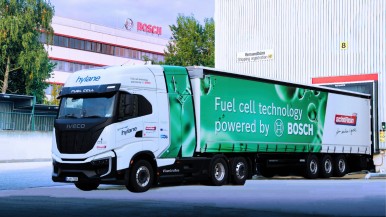Home help, bodyguard, and butler – until now, only pop stars or top earners have been able to treat themselves to a personal assistant. Now Bosch is looking to change that by offering digital assistants that can lighten everyone’s load or call for help in an emergency. What makes this possible is the internet of things. Soon refrigerators, cars, and smart homes will be communicating with each other autonomously in the cloud. Where today the likes of Siri and Alexa can carry out simple voice commands, in the future digital assistants will be able to make our everyday lives easier without any instructions. The following examples show how that works:
Traffic jam? The refrigerator has a better idea!
The idea is for the digital assistant to combine information from various devices and make all of our lives easier. In order for this to happen, different things must communicate with one another, as Bosch shows with the following example: As you drive home from work, your car’s navigation system reports a traffic jam and suggests an alternative route. This route happens to pass the supermarket. Without a click, the digital refrigerator signals that it is sending the current shopping list to the vehicle display. While the car is parking at the supermarket, the smart home turns up the heating, so that your home is nice and warm for when you arrive 30 minutes later.
Bosch is already paving the way for these connected digital assistants. Whether a home appliance, gardening tool, car, or heating system, each electric product the company produces will feature connectivity.
A connected business trip to London
A business trip to London in the not-too-distant future: just as the freeway exit for the airport comes into view, the mailman rings the doorbell at home. Not a problem, as long as the smart car is connected to the smart home. After a brief video chat with the mailman, the traveler gives an in-vehicle touchscreen command to open the front door. Next stop: the airport parking garage. The vehicle automatically takes over the job of finding a free spot while the traveler goes through security. After the plane has landed in London, the traveler’s smartphone reports “congestion on all access roads” and offers an alternative to a taxi: take the train to Regent’s Park, where an electric car has been reserved for the remainder of the journey.
This scenario is realistic in the medium term. The technology is already at an advanced stage: according to the Electronica Trend Index 2020, 63 percent of those surveyed are in favor of having a digital assistant for their everyday lives.




